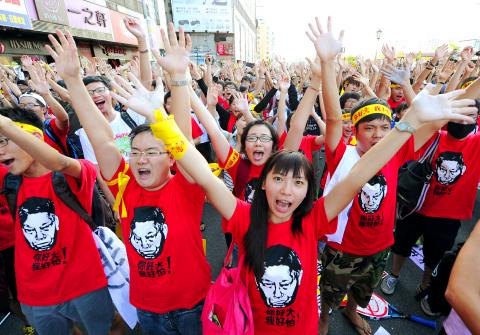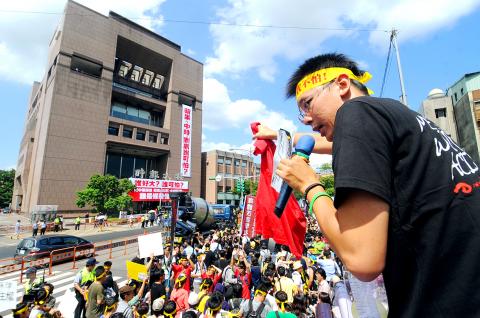|
Thousands protest
media monopoly
‘MEDIA MONSTERS’: Journalists, students and
activists demonstrated in the wake of Want Want China Times Group’s vendetta
against an opponent of its merger plan
By Loa Iok-sin / Staff reporter

Participants in a protest in
Taipei yesterday against media monopolies hold up signs and shout slogans
demanding media professionalism, an apology from the Want Want China Times Group
and supervision by the National Communications Commission.
Photo: CNA

A protester speaks outside the
"China Times" offices in Taipei during a demonstration against media monopolies
staged by media reform organizations yesterday. The newspaper had hung banners
with the words “Apple Daily or the China Times: who is worse?” and “Who is the
biggest? Who is the worst?”
Photo: Lo Pei-der, Taipei Times
Thousands of journalists, students,
academics and social activists yesterday took to the streets in Taipei to
protest against monopolization of the media and demanded that the National
Communications Commission (NCC) help break monopolization of the media.
“No to monopolization of the media, protect professionalism in media,” thousands
chanted as they marched from Want Want China Times Group (旺旺中時集團) headquarters
to the NCC headquarters in Taipei.
Many of the demonstrators held home-made signs and placards with slogans against
media monopolization or the Want Want China Times Group, such as “You’re big,
but I’m not scared,” “I would like my news without additives” and
“Non-professional media operators should go back to making biscuits.”
One woman taking part in the march wore a mask that looked like two hands
covering her eyes and held a sign reading: “Media monopoly blinds my eyes.”
“We are gathered here because we are upset that [Want Want China Times Media
Group chairman] Tsai Eng-ming (蔡衍明) used media outlets under the group as his
own personal tool to attack his enemies. We’re also worried that when the group
gets its hands on the largest cable TV service provider, it will be a disaster
for the country,” Association of Taiwan Journalists (ATJ) chairwoman Chen Hsiao-yi
(陳曉宜) told the crowd.
The ATJ, along with the Campaign for Media Reform, Taiwan Media Watch, the
Alliance against Media Monsters and the Youth Alliance against Media the
demonstration.
“We are here to demand our freedoms of expression and of media,” Chen said. “We
call on Tsai to give up his merger plan with China Network Systems (CNS, 中嘉網路).”
Chen was referring to a Want Want plan to acquire some of the cable TV services
owned by CNS, the largest cable TV service provider in the country, that was
conditionally approved by the NCC last month.
The merger plan has worried many because the Want Want China Times Group already
owns several media outlets, including newspapers, a magazine, TV channels and a
radio station. Opponents worry that if Want Want buys CNS’ cable TV services, it
may be able to interfere with other media outlets, with the power to decide
which channels may be broadcast via cable.
The issue did not attract too much public attention until last month, when all
media outlets under the group launched a series of reports accusing the Academia
Sinica research fellow — who is a strong opponent to the merger case — of paying
students to join anti-merger rallies, which was later proved to be false.
When one National Tsinghua University student, Chen Wei-ting (陳為廷), questioned
Want Want’s motives, he also became a target of criticism by media outlets under
the group.
“CtiTV [of the Want Want China Times Media Group] aired news reports criticizing
me 24 hours a day during that time, and each news report could take as long as
15 minutes of air time,” Chen Wei-ting said. “This shows how horrible things
could get when a media group has a monopoly.”
Some foreign students also joined the march.
Chong Yee-shan (張玉珊), from Malaysia, said she joined because media monopoly is
also a serious problem in her own country, especially in Chinese-language media
outlets.
Several human rights groups, such as the Taiwan Association for Human Rights,
the Deng Liberty Foundation, Taiwan Students for a Free Tibet, Taiwan Labor
Front (TLF) and the Humanistic Education Foundation, participated.
“The media issue is important for social groups, especially those who are
working for the rights of the disadvantaged in our society,” TLF
secretary-general Son Yu-lian (孫友聯) said. “When all media outlets are in hands
of big corporations, disadvantaged people will be silenced.”
Journalism students were among the most predominant groups in the march.
“I want to become a journalist when I finish school, so I am concerned about the
work conditions for journalists,” said Kuo Chih-jung (郭芝榕), a student at
National Taiwan University’s Graduate Institute of Journalism. “I would like to
call on the government to help maintain the independence of media outlets.”
Another journalism student surnamed Lee (李) said she was concerned about how the
awareness and energy of the demonstration could be maintained, so that real
reform of the media could succeed.
The parade ended in front of the NCC headquarters, as the crowd called on the
institution to make or revise laws to help maintain the independence of media
outlets, which an NCC official who accepted a petition from ATJ head Chen
Hsia-yi promised to help out.
In response, Want Want China Times Group published a full-page advertisement in
the China Times yesterday asking: “Who is big? Who is scared?”
“Our news reporting has been always professional and can be scrutinized. We
welcome all criticism,” the advert said.
Additional reporting by CNA
|
![]()
![]()
![]()